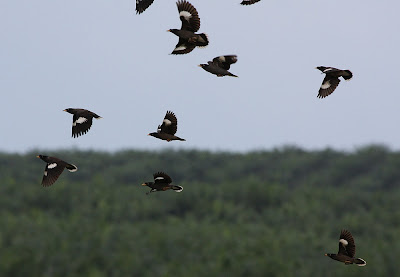


Black Bazas were the commonest raptor we saw, and they already seemed to be on the move northwards.



Crested Goshawks were also in evidence in a couple of places. This is the male of a pair breeding in a large garden.

Long-tailed Parakeets were nesting in the same garden!

Estates are encouraged to allow large trees to grow along rivers to provide habitat for birds that naturally predate pest species. When we think of predators, we don't usually think of birds like Ashy Minivets, but, as this photo shows, they play a useful part in helping to control the numbers of caterpillars.

Estates encompass a wide variety of habitats, including freshwater swamps. This one held many egrets, Lesser Whistling Ducks, and a number of waders.

Grey-headed Lapwings seem to be wintering further and further south these days.

A Pintail or Swinhoe's Snipe

Wood Sandpiper is the commonest of the waders on the estates.

A Purple Heron stands statuesque beside a canal.

It was interesting to note Jungle Mynas mixing with Javan Mynas. Javan are the more recent immigrant, and have tended to replace Jungle wherever they move in. Perhaps here the Javan are recent arrivals? (The lower middle bird in this picture is probably a Javan).

Oriental Pied Hornbills were a conspicuous feature of the settlement areas.

I spotted this young cobra hunting frogs on the football field!

The dark-breasted Barn Swallow on the top right appears to be the 'tytleri' race.

A cool dragonfly to finish off with. This is Hydrobasileus croceus, found on the edge of a relict forest patch.
No comments:
Post a Comment